初二资料Unit 2 Topic 2
仁爱版英语八年级上册Unit 2 Topic 2 重难点知识归纳总结
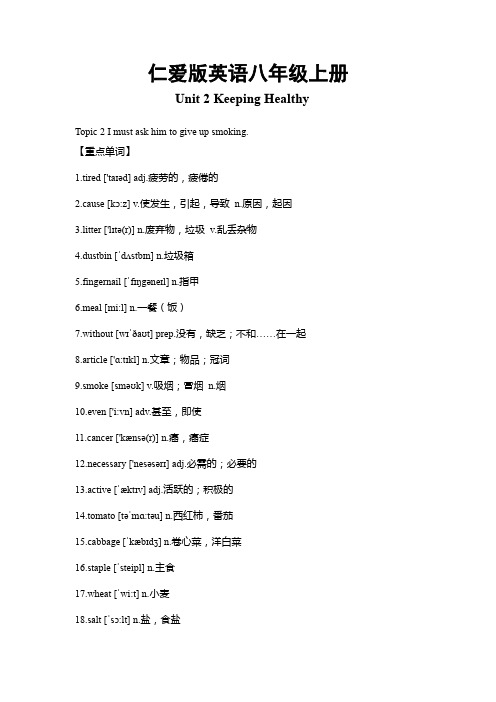
仁爱版英语八年级上册Unit 2 Keeping HealthyTopic 2 I must ask him to give up smoking.【重点单词】1.tired ['taɪəd] adj.疲劳的,疲倦的2.cause [kɔ:z] v.使发生,引起,导致n.原因,起因3.litter ['lɪtə(r)] n.废弃物,垃圾v.乱丢杂物4.dustbin [ˈdʌstbɪn] n.垃圾箱5.fingernail [ˈfɪŋgəneɪl] n.指甲6.meal [mi:l] n.一餐(饭)7.without [wɪˈðaʊt] prep.没有,缺乏;不和……在一起8.article ['ɑ:tɪkl] n.文章;物品;冠词9.smoke [sməʊk] v.吸烟;冒烟n.烟10.even ['i:vn] adv.甚至,即使11.cancer ['kænsə(r)] n.癌,癌症12.necessary ['nesəsərɪ] adj.必需的;必要的13.active [ˈæktɪv] adj.活跃的;积极的14.tomato [təˈmɑ:təu] n.西红柿,番茄15.cabbage [ˈkæbɪdʒ] n.卷心菜,洋白菜16.staple [ˈsteipl] n.主食17.wheat [ˈwi:t] n.小麦18.salt [ˈsɔ:lt] n.盐,食盐19.sugar [ˈʃugə] n.食糖20.illness [ˈɪlnəs] n.疾,疾病21.weak [wi:k] n.虚弱的,无力的22.cream [kri:m] n.奶油,乳脂23.ice cream 冰淇淋24.force [fɔ:s] v.强迫,迫使25.childhood [tʃaildhud] n.童年,幼年26.plate [pleɪt] n.盘子,碟子;一盘27.mad [maid] adj.疯的28.taste [teɪst] v.尝,品;吃n.味道29.surprise [səˈpraɪz] v.使惊奇,使诧异n.惊奇,惊讶30.watermelon [ˈwɔ:təmelən] n.西瓜31.potato [pəˈteɪtəʊ] n.土豆,马铃薯32.sandwich ['sænwɪdʒ] n.三明治(夹心面包片)33.strawberry ['strɔ:bərɪ] n.草莓34.beef [bi:f] n.牛肉35.biscuit [biskit] n.饼干36.such [sʌtʃ] pron.这样的,那样的,类似的37.etc [etsetərə] abbr.等等,以及其他38.fact [fækt] n.事实,真相;现实39.unhealthy [ʌn'helθɪ] adj.不健康的40.chemical [kemikl] n.化学品41.cigarette [sigəret] n.香烟,纸烟42.body ['bɒdɪ] n.身体43.disease [dɪˈzi:z] n.病,疾病44.harm [ha:m] v.&n.危害,伤害,损害45.smoker [sməʊkə] n.吸烟者46.second-hand adj. 二手的,旧的47.risk [risk] n.危险,风险v.(使)冒……的风险48.possible [pɔsəbl] adj.可能;能做到【重点短语】1.in fact 事实上,实际上2.as... as possible 尽量……地3.give up 放弃4.stay up late 熬夜5.be bad for 对……有害6.put... into... 把……放进……7.get up 起床8.be good for 有利于9.take a walk 散步10.have a bath 沐浴11.force sb to do sth 强迫某人做某事12.leave for 动身去,出发前往【重点句型】1.Staying up late is bad for your health. 熬夜对你的健康有害。
Unit 2 Topic 2知识梳理仁爱版英语八年级上册
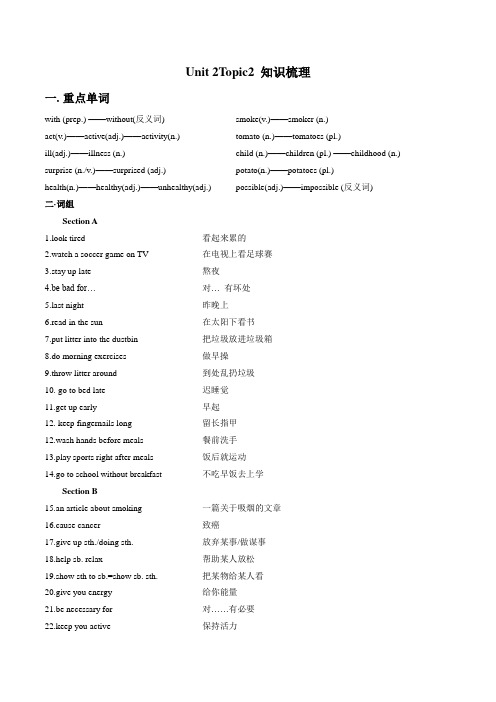
Unit 2Topic2 知识梳理一.重点单词with (prep.) ——without(反义词) smoke(v.)——smoker (n.)act(v.)——active(adj.)——activity(n.) tomato (n.)——tomatoes (pl.)ill(adj.)——illness (n.) child (n.)——children (pl.) ——childhood (n.) surprise (n./v.)——surprised (adj.) potato(n.)——potatoes (pl.)health(n.)——healthy(adj.)——unhealthy(adj.) possible(adj.)——impossible (反义词) 二·词组Section A1.look tired 看起来累的2.watch a soccer game on TV 在电视上看足球赛3.stay up late 熬夜4.be bad for… 对… 有坏处st night 昨晚上6.read in the sun 在太阳下看书7.put litter into the dustbin 把垃圾放进垃圾箱8.do morning exercises 做早操9.throw litter around 到处乱扔垃圾10. go to bed late 迟睡觉11.get up early 早起12. keep fingernails long 留长指甲12.wash hands before meals 餐前洗手13.play sports right after meals 饭后就运动14.go to school without breakfast 不吃早饭去上学Section B15.an article about smoking 一篇关于吸烟的文章16.cause cancer 致癌17.give up sth./doing sth. 放弃某事/做谋事18.help sb. relax 帮助某人放松19.show sth to sb.=show sb. sth. 把某物给某人看20.give you energy 给你能量21.be necessary for 对……有必要22.keep you active 保持活力23.take a walk 散步Section C24.be careful (not) to do sth… 小心(不)要做做谋事25.cause illness/diseases 引发疾病26.take care of sb. well= take good care of sb.照顾好某人27.force sb. to do sth. 强迫某人做谋事28.during one’s childhood 在某人童年时期29.make sb. do sth. 使某人做谋事30.get mad 生气31.be surprised to do sth. 做谋事感到很吃惊32.as soon as… 一…就…33.during his childhood 在他的童年期间34.by chance 偶然地Section D35.as soon as possible 尽快36.not only… but (also)… 不仅…而且…37.tell sb. (not) to do sth. 告诉某人(不)要做谋事38.in fact 实际上,事实上三.重点句子1. I’m sorry to hear that. 听到这个我感到很抱歉。
最新-仁爱英语八年级上册Unit2 Topic2(共40张PPT)-PPT文档资料

C.orange,strawberry
D.potato,carrot
What do you usually have for meals?
I usually have bread and eggsfor my breakfast. I usually have rice and meat for my lunch. I usually havefish and noodlesfor my supper.
Michael一见到它就生气。
Meat: chicken, fish,___________________________
Fruits: apple, banana, __________________________
Staple: rice, wheat, ___A_._n_o_o__d_le_s__,d_u__m_p_l_in__g_s_______B.beef,pork,steak
wheat[wi:t]
watermelon [’wɔ:təmelən]
potato chips [tʃɪps]
sandwich ['sænwɪtʃ]
strawberry[‘strɔ,bɛri]
beef[bi:f]
biscuit[‘bɪskɪt]
Let’s divide the food into groups.
Unit 2 Keeping Healthy
Topic 2 I must ask him to give up smoking
Teaching Objectives(教学目标):
1.知识目标:了解食物的相关词汇及本篇短语,如: cabbage,watermelon,strawberry, beef, biscuit; force sb. to do sth., be surprised to do sth., etc..
仁爱英语八年级上册Unit2-topic2知识点总结
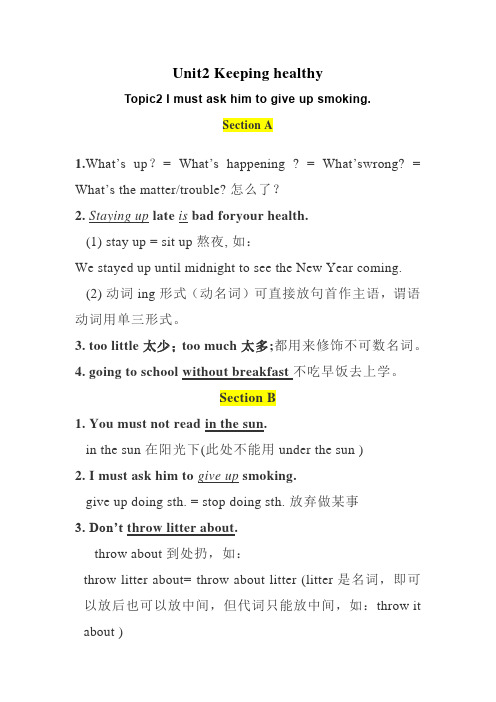
Unit2 Keeping healthyTopic2 I must ask him to give up smoking.Section A1.What’s up?= What’s happening ? = What’swrong? = What’s the matter/trouble? 怎么了?2. Staying up late is bad foryour health.(1) stay up = sit up熬夜, 如:We stayed up until midnight to see the New Year coming. (2) 动词ing形式(动名词)可直接放句首作主语,谓语动词用单三形式。
3. too little 太少; too much 太多;都用来修饰不可数名词。
4. going to school without breakfast 不吃早饭去上学。
Section B1. You must not read in the sun.in the sun 在阳光下(此处不能用under the sun )2. I must ask him to give up smoking.give up doing sth. = stop doing sth. 放弃做某事3. Don’t throw litter about.throw about 到处扔,如:throw litter about= throw about litter (litter是名词,即可以放后也可以放中间,但代词只能放中间,如:throw it about )4. go for a walk 去散步; take a walk = have a walk 散步5. It will keep you active during the day.(1)keep + 宾语+ 补语(补语可以是:动词ing 形式;形容词;介词短语)①I’m sorry to keep you waiting for sucha long time. (keep sb. doing sth.使某人一直做某事 )②Keep the door open, please. (keep sb/sth+形容词表示某人/某事物保持怎样的状态)③Once a cold keep the child in bed forthree days (keep sb+介词短语表示某人呆在某地)(2) during the day = in the daytime 在白天Section C1. It may show that something is wrongwith your health.(1) show sb. sth. = show sth. to sb. 向某人展示某物 please show me your new book.(2) show sb. around 某地表带某人参观某地:I’ll show you around our schooltomorrow.2. You can get a headache when you exercise onan empty stomach.on an empty stomach 空腹3. We can get into the human body throughthe nose.(1) get into 进入,陷入; 如:get into trouble 陷入麻烦(2)①through 从物体内部穿过,如:walk through a forest.②across 从物体表面横穿,如:go across the road③ over 从物体上空越过, 如:fly over the city4. The boy has an illness.illness = sickness疾病(名词),很少表示具体的疾病,只表示抽象的疾病,disease 常表某种疾病。
【归纳】仁爱英语八年级上册Unit 2 Topic 2 重点知识梳理
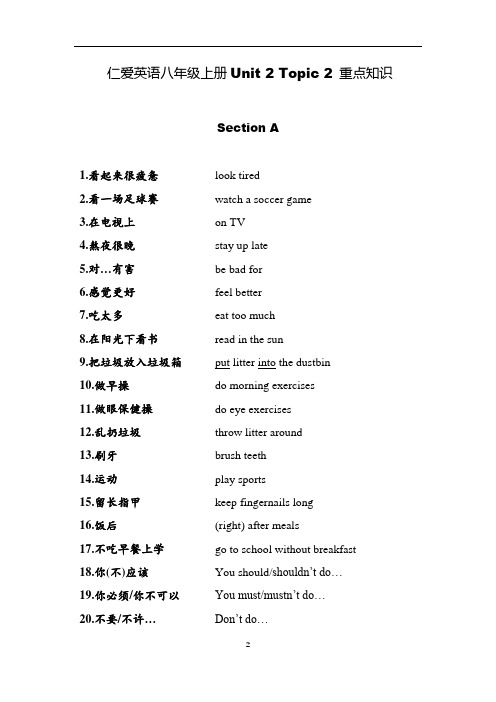
Section A1.看起来很疲惫look tired2.看一场足球赛watch a soccer game3.在电视上on TV4.熬夜很晚stay up late5.对…有害be bad for6.感觉更好feel better7.吃太多eat too much8.在阳光下看书read in the sun9.把垃圾放入垃圾箱put litter into the dustbin10.做早操do morning exercises11.做眼保健操do eye exercises12.乱扔垃圾throw litter around13.刷牙brush teeth14.运动play sports15.留长指甲keep fingernails long16.饭后(right) after meals17.不吃早餐上学go to school without breakfast18.你(不)应该You should/shouldn’t do…19.你必须/你不可以You must/mustn’t do…20.不要/不许… Don’t do…Section B1.读一篇关于吸烟的文章read an article about smoking2.在报纸上in the newspaper3.引发癌症cause cancer4.放弃(做)某事give up (doing) sth.5.给你能量、精力give you energy6.对…是有必要的be necessary for7.使某人保持活力keep you active8.在白天during the day9.喝足够的水drink enough water10.去散步take a walk=go for a walk11.在周末on weekends12.学到深夜study late into night13.在白天during the day14.洗澡have a bath=take a bath(多指盆浴)have a shower=take a shower(多指淋浴)15.呼吸新鲜空气take a fresh breath16.早睡早起。
仁爱英语八年级上Unit2.topic2知识点归纳
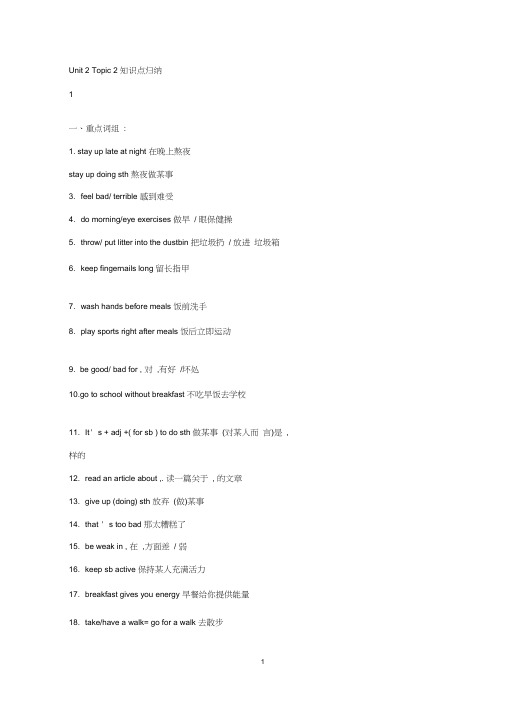
Unit 2 Topic 2 知识点归纳1一、重点词组:1. stay up late at night 在晚上熬夜stay up doing sth 熬夜做某事3. feel bad/ terrible 感到难受4. do morning/eye exercises 做早/ 眼保健操5. throw/ put litter into the dustbin 把垃圾扔/ 放进垃圾箱6. keep fingernails long 留长指甲7. wash hands before meals 饭前洗手8. play sports right after meals 饭后立即运动9. be good/ bad for , 对,有好/坏处10. g o to school without breakfast 不吃早饭去学校11. It' s + adj +( for sb ) to do sth 做某事(对某人而言)是,样的12. read an article about ,. 读一篇关于, 的文章13. give up (doing) sth 放弃(做)某事14. that ' s too bad 那太糟糕了15. be weak in , 在,方面差/ 弱16. keep sb active 保持某人充满活力17. breakfast gives you energy 早餐给你提供能量18. take/have a walk= go for a walk 去散步19. walk on the lawn 在草坪上走20. be careful (not) to do sth 小心翼翼(别) 去做某事21. force sb to do sth 强迫某人做某事22. as soon as 一,就, .23. during one ' s childhood 在某人童年24. get mad 生气,变疯25. be always doing sth 总是做某事26. to one ' s surprise 令某人吃惊的是be surprised to do sth 惊奇地做某事be surprised at sht 对某事感到惊讶27. u se sth to do sth= use sth for doing sth 利用, .做,.28. as,as possible= as, as one can 尽可能的, . as soon/much as possible 尽可能快/ 多29. drink sour milk 喝变质牛奶30. t idy one ' s room 整理房间31. make one 's bed 整理床铺32. spit everywhere/in public 到处/ 在公共场合吐痰33. as we (all) know 众所周知34. help sb relax 帮助某人放松35. in fact 事实上,实际上36. not only , but (also), 不仅,而且, .37. d uring the day= in the daytime 在白天38. make sb do sth 使某人做某事39. cause cancer 引发癌症40. in the newspaper 在报纸上、必背重点句型1.Staying up late is bad for your health. 熬夜对你的健康有害. (动名词短语做主语,谓语动词用三人称单数)2.Is going to bed early good or bad for your health? It' s good.早点睡觉对你的健康有益还是有害? 有益. (选择问句要根据事实回答)3.It will keep you active in the daytime. 它(早睡早起)将使你在白天保持旺盛的精力.4. You must not throw litter about.= Don' t throw litter about. 不要乱扔垃圾.5. The article says smoking is bad for our lungs. 文章上说吸烟对我们的肺有害6. I must ask him to give up smoking. 我必须叫他戒烟。
八年级上册英语u2t2知识点
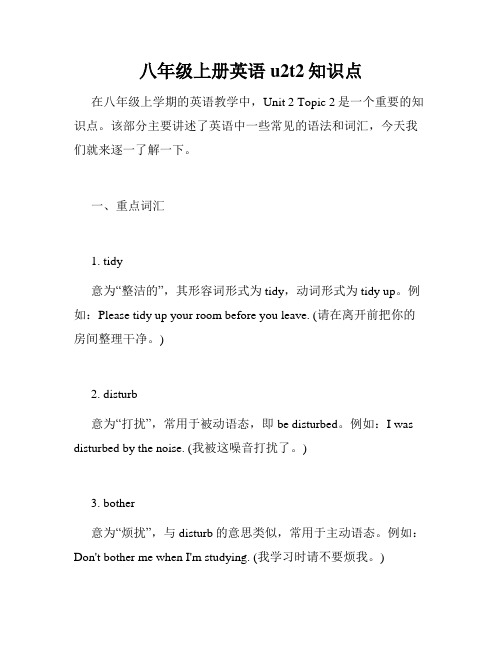
八年级上册英语u2t2知识点在八年级上学期的英语教学中,Unit 2 Topic 2是一个重要的知识点。
该部分主要讲述了英语中一些常见的语法和词汇,今天我们就来逐一了解一下。
一、重点词汇1. tidy意为“整洁的”,其形容词形式为tidy,动词形式为tidy up。
例如:Please tidy up your room before you leave. (请在离开前把你的房间整理干净。
)2. disturb意为“打扰”,常用于被动语态,即be disturbed。
例如:I was disturbed by the noise. (我被这噪音打扰了。
)3. bother意为“烦扰”,与disturb的意思类似,常用于主动语态。
例如:Don't bother me when I'm studying. (我学习时请不要烦我。
)4. organize意为“组织,整理”,其名词形式为organization。
例如:We need to organize a party for our class. (我们需要为我们的班级组织一次派对。
)5. laundry意为“洗衣房,洗好的衣服”,其动词形式为wash。
例如:Can you help me with the laundry? (你能帮我洗衣服吗?)二、重点语法1. there be句型该句型表示“某处有某物或某人”的意思。
例如:There is a cat on the table. (桌子上有一只猫。
) 在这个句型中,谓语动词be应与后面的名词或代词保持一致。
2. 疑问句的转换将陈述句转换成一般疑问句时,需要在句首加do或does (主语为第三人称单数),将句子结尾的句点改成问号。
例如:You have a book. (你有一本书。
) → Do you have a book? (你有书吗?)将陈述句转换成特殊疑问句时,需要把疑问词放在句首,其余部分的顺序不变。
最新仁爱版英语八年级上册Unit 2 Topic 2知识点 完整版
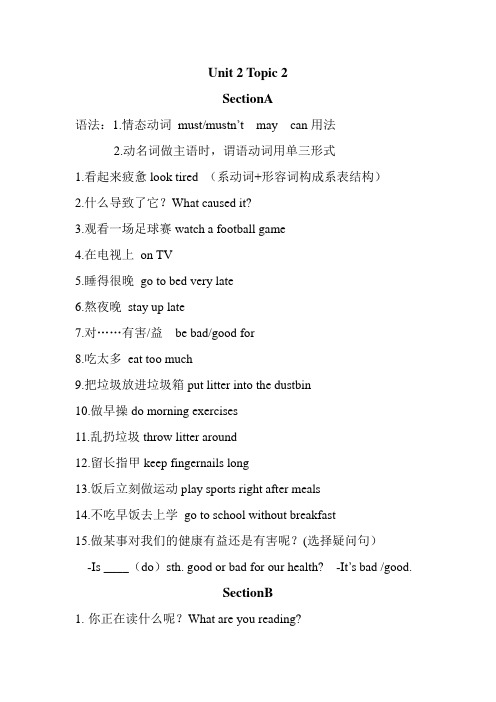
Unit 2 Topic 2SectionA语法:1.情态动词must/mustn’t may can用法2.动名词做主语时,谓语动词用单三形式1.看起来疲惫look tired (系动词+形容词构成系表结构)2.什么导致了它?What caused it?3.观看一场足球赛watch a football game4.在电视上on TV5.睡得很晚go to bed very late6.熬夜晚stay up late7.对……有害/益be bad/good for8.吃太多eat too much9.把垃圾放进垃圾箱put litter into the dustbin10.做早操do morning exercises11.乱扔垃圾throw litter around12.留长指甲keep fingernails long13.饭后立刻做运动play sports right after meals14.不吃早饭去上学go to school without breakfast15.做某事对我们的健康有益还是有害呢?(选择疑问句)-Is ____(do)sth. good or bad for our health? -It’s bad /good.SectionB1.你正在读什么呢?What are you reading?2.最好别做某事had better not do sth.3.对……有害be bad for4.在报纸上in the newspaper5.帮助某人做某事①help sb.(to) do sth. ②help sb. with sth.6.那太糟糕了。
That’s too bad.7.致癌cause cancer8.多么糟糕!How terrible!9.请某人(不)做某事ask sb (not) to do sth.10.放弃做某事give up doing sth. stop doing sth.11.三借①从···借入borrow···from ②借出给···lend···to③延动:keep (How long can I keep it?)12.出示某物给某人show sb sth=show sth to sb带领某人参观···show sb around炫耀,卖弄show off 出现,露面show up=turn up 13.对某人来说做某事对……是必要的It’s necessary for sb. to do sth.14.使你有活力keep you active15.15.在周末on weekendsSectionC1.所···的what (引导宾语从句)I’m sorry for what I said.2.当心不做某事be careful not to do sth.3.太多too many=many(后+可名复)太多too much=much(后+不可名)太much too=too(后+形/副)4.它可能导致疾病。
初二unit2 topic 2

Unit 2 Topic 2(八上)Ⅰ.单项选择。
(10分)( )1.—Watching TV too much _______ bad for your eyes.—I’ll go to bed right away.A.isB.areC.wasD.be( )2.—If you feel _______, you should go to school.A.badB.worseC.betterD.good( )3.—How often do you exercise?—_______A.Less than three times a week.B.More than 10 hours.C.From one thirty to three.D.I often do it.( )4._______ necessary for us _______ English well.A.This is; to learnB.It’s; to learnC.It’s; learnD.That’s; learn( )5.If you eat _______ food and take _______ exercise, you’ll keep healthy.A.more; moreB.less; lessC.more; lessD.less; more( )6.—Humans can’t live _______ air.—I agree with you.A.withoutB.withC.inD.for( )7.—I can’t keep myself active during the d ay.—You _______ take more exercise.A.must notB.must beC.need toD.may be( )8.This article says _______ is bad for our lungs.A.smokeB.to smokeC.smokedD.smoking( )9.You had better ask your brother _______ playing computer games. It’s bad f or him.A.to give upB.not to give upC.to give it upD.not give it upⅡ.情景交际。
仁爱版八年级上册英语-Unit2:Topic2单词汇总+知识梳理

仁爱版八年级上册英语-Unit2:Topic2单词汇总+知识梳理仁爱八上-Unit2 Topic2知识梳理【重点短语】1.stay up late 熬夜到很晚2.do morning exercises 做早操3.throw litter around 到处乱扔垃圾4.read in the sun 在太阳下读书5.in the newspaper在报纸上6.give up doing sth.7.show sth. to sb.=show sb. sth.8.It’s +adj.+ for sb. to do sth.对某人来说做某事……9.be careful not to do sth.小心不要做某事10.force sb. to do sth.迫使某人做某事11.leave for sp. 前往某地12.as soon as…一……就……13.get/be mad 发疯14.be surprised to do sth. 惊奇于做某事15.in fact 事实上16.as soon as possible 尽可能快的【重点句型】1.Staying up late is bad for your health.熬夜到很晚对你的健康有害。
2.I must have a good rest.我一定要好好休息。
3.You’d better not read in the sun.你最好不要在太阳下读书。
4.I must ask him to give up smoking.我一定让他放弃抽烟。
5.He thinks smoking can help him relax.他认为抽烟可以帮他放松。
6.It may even cause cancer.它甚至导致癌症。
7.May I borrow your newspaper and show it to my father? 我可以借你的报纸给我爸爸看看吗?8.How terrible!多么糟糕呀!9.It’s bad for your health.这对你健康有害。
八年级上Unit 2 Topic 2.单词、词组和句型

八年级上Unit 2 Topic 1Section A(1) 单词:牙痛_________ 牙科医生_________ 咳嗽________头疼_________ 发烧_________ 流行感冒________胃疼_________ 咖啡________ 茶;茶叶_________大量,充足_________ 烧开________ 电梯;举起_________ (2) 词组:患感冒___________________ 患重感冒____________________在夜晚_________________ 大量,丰富________________开水______________ 康复______________________看医生_____________ 休息____________________(3) 重点句型:①你怎么了?_____________________________________________________②我很抱歉听到这消息。
_____________________________________________________③你应该去看医生。
_____________________________________________________④希望你快快康复。
_____________________________________________________①你患重感冒了?我很抱歉听到这个消息。
__________________________? __________________________.②你晚上不应该喝茶。
You _____________________________.③她看医生之后就好了。
She________________ after she __________________________.④每天我们都应该喝大量的开水。
Unit 2 Topic 2 Section C-八年级英语上册课件(仁爱版)

for school, she had to drink a glass of
不得不做某事
milk because her mother was always
watching her.
be always doing sth.
一直在做某事; 总是做某事
Key points
During Michael's childhood, he had to
Task 3 1c Read 1a and circle True or False.
1. Kangkang’s mother often told him not to eat much sugar
when he was a child.
True False
2. Maria’s teeth were not strong because she liked eating ice
保持健康
eat many vegetables and fruit to keep healthy.
为了,表目的
Once, cabbage was on his plate. As soon as
曾经
一...就...
Michael saw it, he got mad.But his mother
变的疯了
made him taste it. He was surprised to find make sb. do sth. 对...感到惊讶 that it was delicious!
让某人做某事
Watch and understand, and then read 1a after the vedio.
Key points
- 1、下载文档前请自行甄别文档内容的完整性,平台不提供额外的编辑、内容补充、找答案等附加服务。
- 2、"仅部分预览"的文档,不可在线预览部分如存在完整性等问题,可反馈申请退款(可完整预览的文档不适用该条件!)。
- 3、如文档侵犯您的权益,请联系客服反馈,我们会尽快为您处理(人工客服工作时间:9:00-18:30)。
初二级辅导资料Unit 2 Topic 2Class:________________ Name:________________Unit 2 Topic 2一、单选题( ) 1. —Would you like to have a cup of ? —.A. tea of milk; Yes, I’d love toB. milk tea; Yes, please.C. tea with milk; Yes, I’d glad to.D. tea with milk; No, thanks.( ) 2. —Would you mind my opening the window? —. It’s blowing strongly outside.A. You’d better not.B. Don’t worryC. Not at all.D. Sure.( ) 3. —What’s Jack do ing over there? —He’s looking for him.A. something important forB. important something toC. something important toD. important something for( ) 4. Yesterday my mother met an old friend home.A. in the way toB. from the wayC. on the way toD. on the way( ) 5. the little fat girl skiing?A. Does; afraid ofB. Is; afraid toC. Is afraid ofD. Does; afraid to( ) 6. —Why not a trip for this weekend?—Because I’m afraid it snowy at that time.A. planning; maybeB. plan; may beC. planning; may beD. plan; maybe二、句子理解( ) 1.You didn’t tell her my name, did you?A. I’m glad you didn’t tell her my name.B. Were you kind enough to tell her my name?C. I hope you didn’t tell her my name.D. You did tell her my name, didn’t y ou? ( ) 2.He knew he would win the game.A. He won the game.B. He hopes to win the game.C. The game isn’t over yet, but he’s winning.D. He thinks he has won the game.( ) 3. “No,” he said, “I don’t mind getting a newspaper for you.”A. He told me he didn’t remember getting a newspaper for me.B. “No,” he said, “I forgot to get a newspaper for you.”C. At first he refused (拒绝) but then he agreed to get the paper for me.D. He said “Yes, I’ll get a newspaper for you.”( ) 4. “We’re looking for better things in your school report this year,”said Jack’s father.A. Jack’s parents are hoping Jack will get a better school repor t this year.B. Jack’s fa ther is looking for the report, but he can’t find it.C. Jack’s parents are glad that this year’s report is better than last year’s.D. The parents have the report, but they can’t find anything good in it.( ) 5.Would you mind waiting outside the office?A. Did you wait outside the office?B. Did you see anyone waiting outside the office?C. Will you wait outside the office?D. Do you enjoying waiting outside the office?( ) 6.The tea wasn’t sweet enough for Betty to drink.A. Betty didn’t like to drink the sweet tea.B. Betty couldn’t drink the tea; she likes more sugar.C. There wasn’t enough tea, and Betty had nothing to drink.D. Betty drank some of the tea but not enough.( ) 7.He now goes to work on his bicycle instead of by car.A. He still goes to work by car but more often on his bicycle.B. He has now stopped driving to work and goes by bicycle.C. He never goes to work in his car but always on his bicycle.D. After he bought the car, he never goes to work by bicycle.三、中译英1.这是一条两米宽的河流。
This is a river.2.去年夏天我在这里结识了许多新朋友。
I made quite new friends here .3.如果我们不改善环境,它将变得越来越脏。
If we don’t improve the environme nt, it will get .4.—Lucy在哪里?—我不太知道。
也许她在图书馆里。
—Where’s Lucy? —I don’t know. She in the library.5.—你怎么啦?—我感觉不大好,也许得了感冒。
—What’s the matter with you?—I don’t so . I got a cold.6.谁弄哭了这小女孩?Who the little girl ?7.那小胖子害怕游泳吗?that fat boy swimming?8.你还有其他人要接见吗?Do you have to meet?9.少吃肉多吃蔬菜和水果对我们的健康很重要。
meat but vegetable and fruit is very important our health.10.我考试考得不错。
这感觉可真好!I did in the test. I’m so .四、综合填空,根据首字母提示写出单词,完成短文。
A young man is having a physical examination(体检). He doesn’t want to 11 j the army. The doctor is 12 c__________ his eyes. The 13 d says, “Sit down on this chair.”The 14 y man says, “Chair? What chair? ”The doctor says, “Here, please sit 15 d .”“Now look 16 a the chart(图表)”.The young man says, “Chart? What Chart?”The doctor tells the young man, “Your 17 e are very bad. I’m sorry you can’t join the army.” The young man is very 18 h . One day he went to see a film. When the lights were 19 t on, he saw the doctor 20 s next to him. He said at once, “Excuse me, Madam. What time does this bus arrive in New York?”五、阅读理解:(A)( ) 1. What does 2045 mean? It means _________?A. twenty forty-five in the evening.B. eight forty-five in the morning.C. a quarter past eight in the evening.D. a quarter to nine in the evening.( ) 2. What is the flight number from Beijing to Abu Dhabi?A. F002, F004 and F012B.F002, F008 and F012C. F002, F008, and F018D. F012, F016 and F022( ) 3. How long does it take to fly from Beijing to Doha?A. Ten hours.B. Nineteen hours and a half.C. nine and a half hours.D. Six hours and a quarter.( ) 4. On what days can one fly from Beijing to Dubai leaving and arriving in the morning?A. Monday, Wednesday, Thursday and Saturday.B. Monday, Thursday and Wednesday.C. Wednesday.D. Monday.( ) 5. When is it possible for one to fly from Beijing to Bahrain and then to Abu Dhabi on the same day?A. Monday, Wednesday, and Thursday.B. Monday and WednesdayC. Wednesday.D. It’s not possible.(B)2011年下半年斯美剑桥英语初二级辅导资料9-2Class:________________ Name:________________ 家长签名:________________1. Only one writer really is having a great time -which one? Write 1, 2 or 3._____________________2. Whom did P. send the postcard to? __________________________3. Where does Sam come from? _____________________4. What does Sam do every morning? ________________________________________________5. Of the three who needed money most? __________________________(C)Harry Mendis, a 15-year-old British schoolboy, had a long hiccup at the end of last month.His hiccups began one Sunday lunchtime and continued day and night for two weeks. After the first week, Harry’s parents took him to hospital, but it took another week for the doctors to cure(治愈)him. Harry, who is now back at school, is talking about his hiccups.“When I began to hiccup, I drank a glass of water, but that didn’t work. That evening I had hiccups every four seconds. 1 tried many ways to stop them. I held my breath and drank cold drinks. My father even tried to give me a shock, but that didn’t work, either. After a week of sleepless nights, I went to hospital. The doctors couldn’t find anything wrong. They gave me some medicine and my hiccups slowed, down, but it was another week before the medicine worked completely and my hiccups stopped.”Harry was very lucky. The world record holders is the American farmer Charles Smith, who hiccupped for 69 years and 5 months. He stopped hiccups in 1990 at last, but nobody knew why.( ) 1. Harry hiccupped for ______________.A. a weekB. fourteen daysC. twenty-eight daysD. one month( ) 2. Harry’s hiccups started after he _____________.A. drank a glass of milkB. went to hospitalC. finished his homeworkD. ate lunch( ) 3. Harry’s parents decided to take him to hospital when he _______________.A. hiccupped for four secondsB. held his breathC. hiccupped at nightD. couldn’t stop hiccupping( ) 4. What does “shock” in this passage mean in Chinese?A. 咳嗽B. 惊吓C. 喷嚏D. 哈欠( ) 5. Harry’s hiccups stopped one week after the doctor ________________.A. gave him some medicineB. visited himC. gave him a shockD. let him drink cold drinks六、完形填空:When you were young, who rode you around on the back of his bike? Who 1_________ football and flew kites with you in the park? Who helped you with your 2_________ difficult maths problems? Who taught you the difference between 3___________?Your dad. Now it is your turn to do something for him. This Sunday, June 19, it is 4__________ Day. So why not do something 5_________ to thank your dad for all his encouragement and support (支持)?The idea of Father’s Day came from a (an) 6_________ lady called Sonora Smart Dodd in 1909. She wanted a special day to honour (纪念) her father. He raised (抚养) six children by himself 7________ hiswife died during the birth of their sixth child. Dodd thought there needed to be a day to honour courageous (勇敢的), selfless and loving dads. Her father was born 8_________, so she chose to hold the first Father’s Day celebration on his birthday in 1910. In 1924, US President Calvin Coolidge 9__________ the idea of a national Father’s Day. Finally, in 1966, the third Sunday in June was declared (宣布) Father’s Day. There are many ways 10__________ your love and thanks.Send 11_________ a greeting card. Usually fathers prefer cards that are not too emotional (易动感情的). So, perhaps choose one that will make him 12 .A small present, such as a photo of your family or a special wallet 13______ make him feel like a king. Send him 14_________: the red rose is the official Father’s Day flower.If he has a 15________, cover his desktop with words like “I love you, dad!”( ) 1. A. played B. bought C. sold D. gave( ) 2. A. first B. second C. third D. last( ) 3. A. old and young B. big and small C. right and wrong D. long and short( ) 4. A. Mother’s B. Father’s C. Children’s D. Parent’s( ) 5. A. easy B. special C. strange D. attractive( ) 6. A. British B. Japanese C. Chinese D. American( ) 7. A. when B. until C. after D. before( ) 8. A. in May B. on May 19 C. on June 19 D. in July( ) 9. A. liked B. disliked C. needed D. wanted( ) 10. A. to give B. to bring C. to show D. to say( ) 11. A. her B. you C. me D. him( ) 12. A. cry B. jump C. shout D. laugh( ) 13. A. should B. can C. must D. need( ) 14. A. clothes B. books C. flowers D. shoes( ) 15. A. watch B. computer C. car D. bike。
